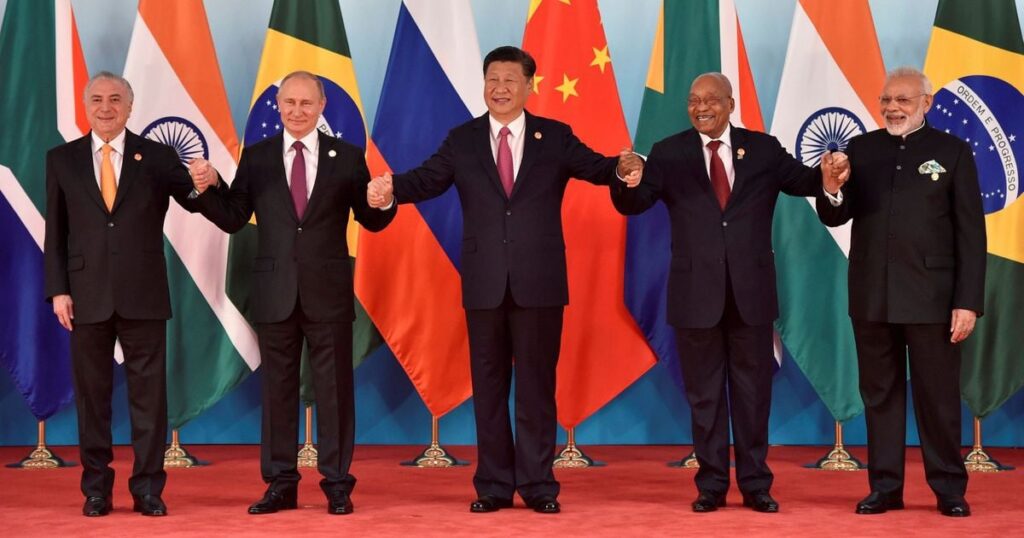BRICS – An Ambitious Power Play Shaping Global Dynamics

BRICS An Ambitious Power Play Shaping Global Dynamics
Introduction
In the ever-evolving landscape of global geopolitics, strategic alliances play a pivotal role in shaping international relations and influencing the course of economic development. Among these alliances, the BRICS consortium stands out as a dynamic and impactful force. Comprising Brazil, Russia, India, China, and South Africa, BRICS represents a coalition of emerging economies that share a common vision of reshaping the global power dynamics.
In this blog post, we will delve into the ambitious power play of BRICS, exploring its objectives, achievements, challenges, and the potential transformation it could bring to the global stage.
Unveiling the Ambitious Agenda
The BRICS alliance emerged in 2006, capturing the world’s attention as a group of rapidly growing economies that sought to challenge the established norms of the global order. While each member nation possesses its own unique cultural, economic, and political identity, they share a collective commitment to fostering economic growth, political influence, and equitable development. The objectives that drive this ambitious power play are multifaceted:
- Economic Cooperation: BRICS nations collectively contribute a substantial portion of the world’s population and gross domestic product. A primary objective is to enhance economic cooperation and trade among member states, leveraging their collective economic clout for mutual growth.
- Counterbalancing Global Powers: BRICS seeks to counterbalance the influence of traditional global powers, promoting a more multipolar world order that accommodates the interests of a broader range of nations.
- Development Initiatives: The alliance is keen on addressing common developmental challenges, poverty reduction, and infrastructure development. By pooling resources and expertise, BRICS aims to uplift the living standards of its citizens and promote sustainable growth.
Accomplishments and Forward-Thinking Initiatives
In its journey so far, BRICS has achieved significant milestones and introduced transformative initiatives that reflect its commitment to collaboration:
- New Development Bank (NDB): The establishment of the New Development Bank stands as a landmark achievement. The NDB provides funding for sustainable infrastructure and development projects in emerging economies, reducing their reliance on conventional lenders.
- BRICS Contingent Reserve Arrangement (CRA): To shield against financial crises, BRICS members introduced the CRA, which functions as a mutual pool of funds to provide short-term liquidity support during times of economic stress.
- Cultural Exchange: Recognizing the importance of cultural exchange in fostering understanding and cooperation, BRICS initiated events like the BRICS Film Festival, showcasing the rich cinematic heritage of its member nations.
Navigating Challenges in the Pursuit of Power Play
Despite the ambitious aspirations of BRICS, the alliance is not without its share of challenges:
- Diverse National Interests: Balancing the diverse national interests and priorities of member nations within the alliance can be complex, often requiring diplomatic finesse and negotiations.
- Economic Disparities: Bridging the economic disparities among member states while fostering growth remains a considerable challenge. Ensuring that the benefits of the alliance are distributed equitably requires careful consideration.
- Geopolitical Realities: As BRICS strives to counterbalance global powers, it must navigate the complex web of geopolitics and potential rivalries that can emerge between its member nations.
A Shifting Global Landscape
The rise of BRICS as an ambitious power play has generated substantial impacts on the global stage:
- Changing Global Center of Gravity: BRICS nations collectively challenge the dominance of traditional Western economies, signaling a shift in the global center of economic influence.
- Alternative Narratives: The alliance presents an alternative narrative that promotes multipolarity and equitable representation in global governance, advocating for a more inclusive world order.
- Economic Growth and Technological Advancement: Through collaborative economic ventures and technology sharing, BRICS has contributed to global economic growth and fostered technological advancements.
Conclusion:
Shaping the World Order
The ambitious power play of BRICS reflects the aspirations of its member nations to reshape the global order and assert their influence on international dynamics. As these emerging economies collaborate to enhance economic cooperation, political influence, and development initiatives, the world watches with interest. While challenges persist and the path forward may not always be smooth, the very existence of BRICS redefines the parameters of global diplomacy and showcases the potential of emerging economies to shape their destinies. As BRICS continues to navigate complexities and push forward its agenda, it leaves an indelible mark on the world stage, transforming the dynamics of international relations.
For More Related Articles Browse Our Website Blogster.pk
For social Connection You can also Visit and follow our Social media Platforms
Facebook , Instagram, Linkedin, Pinterest, Quora, Twitter, Youtube.






